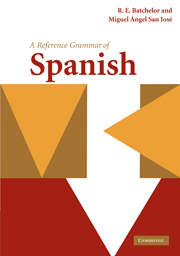Book contents
- Frontmatter
- Contents
- Preface/Prólogo
- Acknowledgments/Agradecimientos
- Abbreviations/Abreviaturas
- Introduction to the Spanish language/Introducción a la lengua española
- Part I
- Part II
- Part III
- Part IV
- Part V
- Part VI
- Part VII
- Part VIII
- Part IX
- Part X
- 76 Names of countries, regions, US states, continents, oceans, rivers, mountains, volcanoes/Nombres de países, regiones, estados de los EE.UU., continentes, océanos, ríos, montañas, volcanes
- 77 Proper names/Nombres propios
- 78 Foreign and indigenous words/Palabras extranjeras e indígenas
- 79 Incorrect use of “la”/“le”/“lo”/Uso incorrecto de “la”/“le”/“lo” (laísmo, leísmo, loísmo)
- 80 Incorrect use of “de” and “que”/Uso incorrecto de “de” y “que” (dequeísmo, queísmo)
- Appendix I Verb tables/ Tablas de verbos
- Appendix II Glossary/Glosario
- Bibliography/Bibliografía
- General index/Índice general
- Subjunctive index/Índice del subjuntivo
78 - Foreign and indigenous words/Palabras extranjeras e indígenas
from Part X
Published online by Cambridge University Press: 05 June 2012
- Frontmatter
- Contents
- Preface/Prólogo
- Acknowledgments/Agradecimientos
- Abbreviations/Abreviaturas
- Introduction to the Spanish language/Introducción a la lengua española
- Part I
- Part II
- Part III
- Part IV
- Part V
- Part VI
- Part VII
- Part VIII
- Part IX
- Part X
- 76 Names of countries, regions, US states, continents, oceans, rivers, mountains, volcanoes/Nombres de países, regiones, estados de los EE.UU., continentes, océanos, ríos, montañas, volcanes
- 77 Proper names/Nombres propios
- 78 Foreign and indigenous words/Palabras extranjeras e indígenas
- 79 Incorrect use of “la”/“le”/“lo”/Uso incorrecto de “la”/“le”/“lo” (laísmo, leísmo, loísmo)
- 80 Incorrect use of “de” and “que”/Uso incorrecto de “de” y “que” (dequeísmo, queísmo)
- Appendix I Verb tables/ Tablas de verbos
- Appendix II Glossary/Glosario
- Bibliography/Bibliografía
- General index/Índice general
- Subjunctive index/Índice del subjuntivo
Summary
Considering foreign and indigenous terms
It could be argued that the lexical aspects of a language should not be considered in a book on its grammatical functions. The first relates more to semantics, or the pursuit of meaning, while the second illustrates how a language is organized. However, it does seem appropriate to offer a chapter on what constitutes, after all, an integral part of any language. The grammar cannot operate meaningfully without the semantic values of the words it organizes. This chapter concentrates, therefore, and in varying lengths, on foreign and indigenous terms: Latinisms, Arabic terms, Anglicisms, Gallicisms, Italianisms, Palenquero, Náhuatl, Basque and Catalan.
Generally speaking, noun borrowings from Latin, Arabic, French and Italian retain the original gender. The reasons for gender assignation for nouns (i.e. definite articles for masculine, feminine, neuter), taken from English, Guaraní, Palenquero, Nahuatl and Basque are not always clear, since the notion of gender of nouns does not exist in these languages.
The terms of these different groups are not treated in the same way.
Latinisms
As stated in the Introduction on the Spanish language, Vulgar Latin is the primary source in the creation and early development of Spanish. However, we are really only concerned here with learned Latinisms borrowed from Latin that have filtered through to modern Spanish, from the medieval and Renaissance periods onwards. A list of Latinisms in current usage, with examples of usage, follow. Here we use a division of R3 and R2 categories.
- Type
- Chapter
- Information
- A Reference Grammar of Spanish , pp. 469 - 484Publisher: Cambridge University PressPrint publication year: 2010



